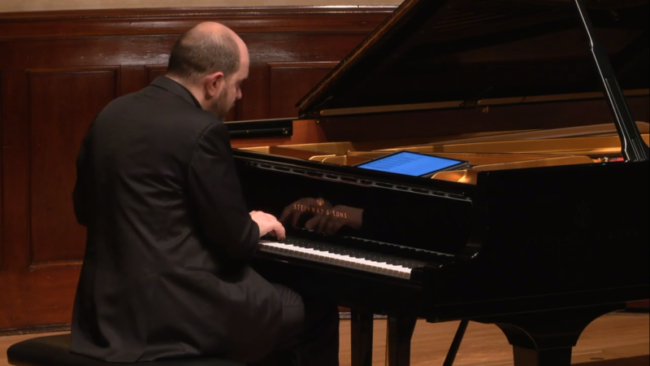 United Kingdom Stravinsky, Schubert, Liszt: Kirill Gerstein (piano). Queen Elizabeth Hall, London. 25.5.2022. (CC)
United Kingdom Stravinsky, Schubert, Liszt: Kirill Gerstein (piano). Queen Elizabeth Hall, London. 25.5.2022. (CC)

Stravinsky – Piano Sonata (1924)
Schubert – Piano Sonata in C minor, D 958 (1828)
Liszt – Harmonies poétiques et religieuses, S 173 (1845-52): Bénédiction de Dieu dans la solitude; Piano Sonata in B minor, S 178 (1853)
One of the great musical thinkers of our time, Kirill Gerstein brings real insight to whatever he touches. Such was certainly the case here at his Queen Elizabeth Hall recital. He started with an unjustifiably little-known work, Stravinsky’s Piano Sonata of 1924. It is Stravinskian Neo-Classicism writ large, with nods everywhere to keyboard music of the eighteenth century; decorations are extracted from history and placed in Stravinsky’s deliciously dry idiom. The arrival of the final cadence always comes as a surprise, no matter how well one knows the piece; such was the case here. No missing the Bach references in the second movement, the left hand underpinning a right-hand line that becomes ever more intricate. Gerstein brough great character to this movement before the finale took us to even greater heights: preternatural evenness of his left hand in the finale was heard in contrast to the more unpredictable right. Gerstein voiced them both so well and, importantly, so differently, as if this were a duet between two separate personalities. Remarkable: frankly, one could have simply left after just this short piece and felt satisfied.
Schubert’s great, late C minor Sonata comes from a different world, and how expertly Gerstein changed his approach and sound to match the music. We hear parallels between the Stravinsky and Schubert in the importance of voicing while appreciating Schubert’s individuality of musical canvas. This is particularly true in the slow movement (Adagio) that in Gerstein’s hands found time standing still in an oasis of peace. What might seem a trivial point really is not: Gerstein counts rests impeccably, allowing the silences to speak (so few musicians do this!). With a Menuetto full of perfectly judged contrasts and with a heart of unrest, Gerstein offered no pause; this was no mere interludial movement before a finale shot through with nervous energy.
The second half of this recital was no less impressive. The Liszt B minor Sonata offers a supreme challenge to any pianist. Another issue is what to pair it with, as at half an hour (approximately) it really requires something. The repertoire chosen can tell a lot about a pianist’s interpretation of the main event: Maurizio Pollini prefaces the sonata with late-period Liszt and goes on to emphasise the Sonata’s modernity. With Gerstein, it was the quarter hour-plus Bénédiction de Dieu dans la solitude, an extended meditation that focuses on weighty interior, philosophical matters. Perhaps one could argue that Gerstein’s projection of the opening line was over-emphasised, but there was no doubting the impassioned nature of this performance, an account which seemed to grow organically. In this piece we find the heart of Liszt’s lyricism at its most powerful. Again, Gerstein’s sound was perfectly attuned to the composer (interestingly, the Steinway at the QEH has two actions, and a technician switched them in the interval, something Gerstein likens to a violinist switching bows for different pieces).
For the mighty B minor Sonata, Gerstein – a pianist of behemoth technique – presented a performance that also brought out the rhapsodising elements of the piece, finding exquisite polyphony in some of the slower passages. Against this was an almost modernistic fugato. Taking lyricism as a basis does not obliterate virtuosity, of course, and Gerstein’s limitless technique is beyond criticism. But it is the structural thought he put into his reading that is surely most impressive: one 30-minute whole, silences again full of tension, climaxes awesome but never breaking the flow (or the tone of the piano). Never was one in doubt as to Liszt’s genius; most impressively, Gerstein’s interpretation had the marks of genius about it: while listening, one was convinced that this is the only way the piece could be read. Lines again emerged with crystalline clarity, regardless of velocity or texture. A superb reading, crowning a memorable concert.
Three encores – Thomas Adès’s ‘Berceuse’ from The Exterminating Angel (the composer was in the audience), Bach/Busoni Nun freut euch, lieben Christen, BWV 734), and Chopin (Waltz in A flat, Op.42) – completed the deal. Gerstein is a consummate musician, a performer of the utmost depth. It was a real privilege to hear this recital.
Colin Clarke
